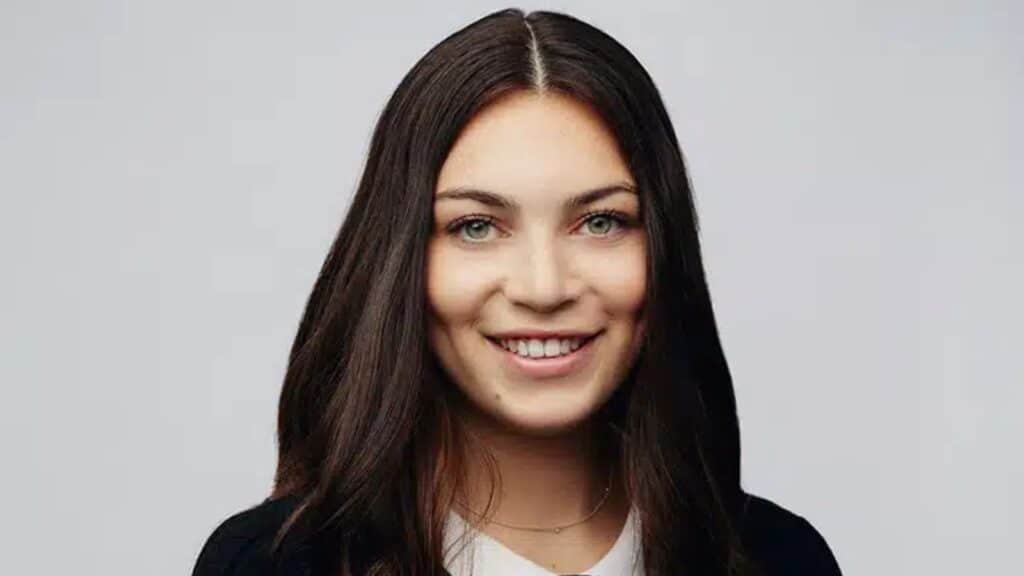“Skating was so much a part of me and I had lost so many aspects of my identity through treatment. I achieved my goal, when people told me I couldn’t. That was incredible.”
Amanda Kauffman
2024 winner of the Lorna Rosenstein Youth Volunteer Leadership Award
Two days before her 17th birthday, Amanda Kauffman was diagnosed with stage 4 non-Hodgkin’s lymphoma. After winning the 2024 Lorna Rosenstein Youth Volunteer Leadership Award, Amanda met with Gilda’s Toronto to discuss her cancer journey.
Tell us what happened.
I was a member of the Junior National Synchronized Skating Team and the captain that year, training more than 20 hours a week, travelling the world representing Canada. The diagnosis flipped my world upside down.
That must have been frightening.
So shocking. When people hear stage 4 cancer, they think it’s incurable. I’ve learned that lymphoma is already a cancer in the blood and lymphatic systems. It’s not as daunting even when it’s stage 4, so you could still live a long life.
Did you have any symptoms?
I was walking home from skating practice when my lower lip went numb. My mom thought it might be an allergic reaction. It persisted for several hours. I saw many specialists and had multiple tests. From January to June 2017, I had symptoms on and off; my lip would go numb and then regain sensation.
I had excruciating knee pain the night before my grade 11 functions exam. My mom suggested to the pediatrician that it might be bone cancer. The pediatrician replied, “Your daughter is a competitive skater. It’s more likely to be a stress fracture or a muscular injury.” I had an x-ray, an MRI, then a knee MRI follow by a full body MRI and immediate admission to Sick Kids. My treatment began the next week. I lived at Sick Kids from July to December 2017. My treatment was intense because kids are resilient and can handle toxins better and bounce back more easily.
My mom or dad slept over every night, my sister visited; my network showered me with love and support.
Did you manage to finish that functions exam?
I did, and I completed my grade 11 year. Grade 12 was an inadvertent gap year. There’s lots of lingering effects and all the psychosocial issues. I lost all my hair; I was not the same girl I was before the diagnosis.
When did you begin to skate again?
My goal was to complete in the Junior World Championships in Croatia in March 2018. My treatment ended in mid December. I had 3 months to go from being bed bound and unable to walk to retraining my mind/muscle connection, regaining strength and learning to skate again. The doctors discouraged me. But it was the light at the end of my tunnel. I competed in Croatia, a triumph for my confidence. I listened to the doctors during treatment who said “don’t skate, don’t go to school.” I realized how naïve and sick I’d been. Skating is in my blood. As soon as I could walk, I was put on skates and I started synchronized skating at 6.
How did your friends react?
They would ask how I was and I would thing, “What do you mean? I’m doing horribly. I’m barely functioning.”
Why did you become a champion for blood donations?
A big part of my healing process was giving back. My parents and grandparents are incredible role models for philanthropy. My cancer journey gave me a purpose.
After I received more than 50 transfusions I became passionate about advocating for that cause. I contacted Canadian Blood Services and learned that it’s much harder to get new donors than to retain longtime donors. I wanted a career in medicine, and I thought my story would inspire others. I joined the Queens University blood team that was recruiting students and running blood and stem cell drives on campus. Now I’m the head of the blood team at University of Toronto’s Faculty of Medicine. We’re educating future doctors and getting them to donate blood. I also ran my 5th Friends and Family blood drive. When people realize that it takes less than 15 minutes and one small poke to save lives, they come back.
Do you still get blood transfusions?
I rely on weekly infusions and will for the rest of my life.
Why did you apply for the Lorna Rosenstein Youth Volunteer Leadership Award?
I feel humbled and honored to represent Gilda’s Toronto. A quote from Gilda resonated with me: “Cancer changes your life often for the better. You learn what’s important, you learn to prioritize and you learn not to waste your time.” I do this through my commitment to running blood drives and encouraging people to give.
Lorna Rosenstein did that when she helped found Gilda’s Toronto. This award embodies being a leader, a commitment to volunteering and the desire to give back.
Find out more about the Lorna Rosenstein Youth Volunteer Leadership Award, visit our award information page.

